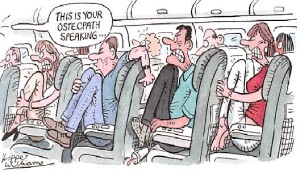Osteopathy is a form of manual medicine that detects and treats damaged parts of the body such as muscles, ligaments, nerves and joints. There are a number of types of osteopathic treatment, from the very gentle cranial techniques through to the more physical manipulative techniques. An American doctor, Andrew Taylor Still, initially founded osteopathy in the United States (AOA) in the late 1800’s. Since then osteopathic schools have been established worldwide. To become an osteopath involves between 4 and 7 years of full-time study, depending on which country you train in. In most countries osteopaths are required to continue to engage in post-graduate development to maintain their registration.
Osteopathy in New Zealand
- Osteopaths are Registered Health Practitioners
- In New Zealand Osteopaths are regulated by the Osteopathic Council of New Zealand (OCNZ) created by the Ministry of Health to enforce the Health Practitioners Competency Assurance Act
- It is illegal to use the term “Osteopath” in NZ without holding a current practicing certificate and being registered with the OCNZ
- Registration is only granted to osteopathic practitioners who obtain proper tertiary qualifications and meet the stringent continuing education requirements of the OCNZ
- All Registered Osteopaths are ACC accredited, and private health care insurers cover some treatment costs
- The Osteopath can assist you by filing your ACC claim for you when you visit them, a visit to your GP is not needed

What can Osteopathy treat?
Osteopaths treat a wide range of problems that the body suffers throughout life. These range from the acute pains caused through injury or trauma, to the chronic pains caused by occupational stress and repetitive strains. Osteopathic treatment can be used in conjunction with your normal medication and can be adapted to treat any age or condition.
What happens when I consult an Osteopath?
The Osteopath will discuss with you the problem you have and will ask questions about your general health and lifestyle and may take your blood pressure and test your coordination and reflexes. The Osteopath will use their hands to test the way your bones, muscles and body moves to find the area that needs to be treated. Sometimes it may be necessary to remove some of your outer clothes so a clearer view of the body can be obtained. They will tell you what they have found and outline how they could treat you, what the out come should be, and how you feel as the treatment progresses. They will carry out the treatment that has been agreed on. You may be advised on any things you could do to prevent the condition returning.
How much will osteopathy cost me?
Osteopathic treatments vary depending on where you live in New Zealand but should reflect the normal costs that will be charged to visit a GP. Some specialized treatments may take a longer time and the charge will reflect this. When you make an appointment you should discuss the charge with the practitioner. If you have a problem that is related to an accident, then ACC will cover part of the cost. An ACC form will need to be filled out during the consultation (you do not need to see your GP to get this form the Osteopath can file the claim for you), and if you live at a distance from the treatment provider, you may be able to claim travel costs.
